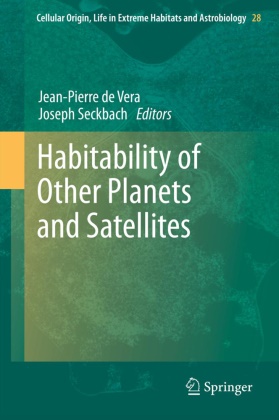Mehr lesen
Is the Earth the right model and the only universal key to understand habitability, the origin and maintenance of life? Are we able to detect life elsewhere in the universe by the existing techniques and by the upcoming space missions? This book tries to give answers by focusing on environmental properties, which are playing a major role in influencing planetary surfaces or the interior of planets and satellites. The book gives insights into the nature of planets or satellites and their potential to harbor life. Different scientific disciplines are searching for the clues to classify planetary bodies as a habitable object and what kind of instruments and what kind of space exploration missions are necessary to detect life. Results from model calculations, field studies and from laboratory studies in planetary simulation facilities will help to elucidate if some of the planets and satellites in our solar system as well as in extra-solar systems are potentially habitable for life.
Inhaltsverzeichnis
Foreword.- Preface.- Introduction.- List of Authors and Their Addresses.- Acknowledgements.- Part 1: PARAMETERS FOR HABITABILITY, HABITABLE ZONES AND LIFE: ENERGY, LIQUID SOLVENT, INFORMATION.- The Habitable Zone: Basic Concepts.- Exoplanets: Criteria for Their Habitability and Possible Biospheres.- The Habitable Zone and The Generalized Greenhouse Effect.- The Influence of UV Radiation on Exoplanets' Habitability.- Factors of Planetary Habitability.- Bio-relevant microscopic liquid subsurface water in planetary surfaces?.- Part 2: IMPACT CRATERS AND THE EVOLUTION OF LIFE.- Organic molecules in lunar ice: a window to the early evolution of life on Earth.- Part 3: FIELD STUDIES IN PLANETARY ANALOGS, SIMULATIONS AND SPACE EXPERIMENTS WITH RELEVANCE TO HABITABILITY.- Experimental simulation of possible origins of life (Conceptual and Practical Issues).- Simulation and measurement of extraterrestrial conditions for experiments on habitability with respect to Mars.- The Role of Terrestrial Analogs in the Exploration of The Habitability of Martian Evaporitic Environments.- Part 4: SEARCH FOR HABITABLE WORLDS IN THE SOLAR SYSTEM AND BEYOND.- Microbial scale habitability on Mars.- Interior and surface dynamics of terrestrial bodies and their implications for the habitability.- Exoplanets and habitability.- Part 5: ALTERNATIVES TO EARTH-LIKE LIFE.- Extremophiles on Alien Worlds: What Types of Organismic Adaptations are Feasible on Other Planetary Bodies.- Brown Dwarfs and Black Smokers. The Potential for Photosynthesis using Radiation from Low-Temperature Black Bodies.- Part 6: APPLICATION OF EXISTING TECHNOLOGIES FOR THE DETECTION OF HABITABLE PLANETS AND THE SEARCH FOR LIFE.- Detection of Habitable Planets and The Search for Life.- Raman Spectral Signatures in the Biogeological Record: An Astrobiological Challenge.- Application of Raman Spectroscopy as In Situ Technology for the Search for Life.- Part 7:FUTURE SPACE MISSIONS FOR LIFE DETECTION.- Habitability on Kepler worlds: Are Moons Relevant?.- Clean In-Situ Subsurface Exploration of Icy Environments in the Solar System.- Part 8: SUMMARY AND CONCLUSIONS.- Theoretically possible habitable Worlds - but soon will we get answers by observations?.- Subject Index.- Author Index.
Zusammenfassung
Is the Earth the right model and the only universal key to understand habitability, the origin and maintenance of life? Are we able to detect life elsewhere in the universe by the existing techniques and by the upcoming space missions? This book tries to give answers by focusing on environmental properties, which are playing a major role in influencing planetary surfaces or the interior of planets and satellites. The book gives insights into the nature of planets or satellites and their potential to harbor life. Different scientific disciplines are searching for the clues to classify planetary bodies as a habitable object and what kind of instruments and what kind of space exploration missions are necessary to detect life. Results from model calculations, field studies and from laboratory studies in planetary simulation facilities will help to elucidate if some of the planets and satellites in our solar system as well as in extra-solar systems are potentially habitable for life.
Zusatztext
From the reviews:
“This edited collection of short papers covers a range of topics relevant to questions of habitability on planetary bodies other than Earth. … the book is perhaps suitable as a primer in aspects of astrobiology associated with questions of habitability of other planets and moons. … Summing Up: Recommended. Upper-division undergraduates and above.” (P. K. Strother, Choice, Vol. 51 (7), March, 2014)
Bericht
From the reviews:
"This edited collection of short papers covers a range of topics relevant to questions of habitability on planetary bodies other than Earth. ... the book is perhaps suitable as a primer in aspects of astrobiology associated with questions of habitability of other planets and moons. ... Summing Up: Recommended. Upper-division undergraduates and above." (P. K. Strother, Choice, Vol. 51 (7), March, 2014)

